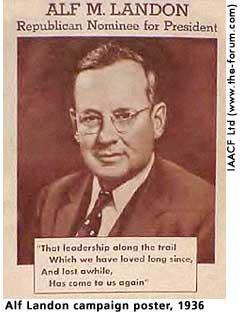Alfred M. Landon (1887-1987)
Alfred Mossman Landon was born in West Middlesex, Pennsylvania, on September 9, 1887. He grew up in Ohio and moved with his family to Kansas when he was seventeen. Landon was a key figure in the U.S. Republican party in the 1930s and ran unsuccessfully for president in 1936.
"Alf" Landon first entered the national political arena in 1912, campaigning for Theodore Roosevelt, who was that year the Progressive party candidate for president. Landon continued to be associated with progressive politics within the Republican party. In 1932, Landon was elected governor of Kansas, and two years later he was the only incumbent Republican governor to be reelected in an otherwise Democratic landslide. This success made Landon a strong candidate to oppose President Franklin D. Roosevelt in 1936.
Landon is often described as a fiscal conservative who nevertheless believed that government must also address social issues. Landon respected and admired FDR and accepted much of the New Deal but objected that it was hostile to business and involved too much waste. At the end of the campaign, Landon accused FDR of acquiring so much power that he was subverting the Constitution. Yet, Landon proved to be an inept campaigner who rarely left his front porch and did not participate in the Republican primaries. Most of the attacks on FDR and social security during the 1936 election were developed by Republican campaigners rather than Landon. Although he won 17,000,000 votes, Landon carried only two states, Maine and Vermont, and FDR's win was the most crushing electoral victory since 1820.
Following his defeat, Landon retired from national politics and finished out his term as governor of Kansas. Later in life he was often asked his opinion, and he did not hesitate to take strong stands.
In the 1930s, he disagreed with Republicans who supported the Neutrality Act; he feared it would mislead Nazi Germany into thinking the United States was unwilling to fight. In World War II he argued against lend-leasing military equipment, urging instead that Britain be given $5 billion outright. After the war, he backed the Marshall Plan while opposing high domestic spending. In 1961, he urged the U.S. to join the European Common Market. Later in the 1960s, Landon backed President Lyndon Johnson on Medicare and other Great Society programs. In November 1962, when he was asked to describe his political philosophy, Landon said: ''I would say practical progressive, which means that the Republican party or any political party has got to recognize the problems of a growing and complex industrial civilization. And I don't think the Republican party is really wide awake to that.''
He died October 12, 1987. His daughter Nancy Landon Kassebaum was elected U.S. senator from Kansas in 1978 and reelected in 1984 and 1990.
Sources:
"Alf Landon: G.O.P. Standard Bearer Dies." Obituary. The New York Times. October 13, 1987.
The American Presidency. "Alfred Landon," presidency.ucsb.edu.
Boyer, Paul, et al. The Enduring Vision: A History of the American People. Boston: Houghton Mifflin, 2000, 725-26.
Kavanagh, Dennis, ed. A Dictionary of Political Biography: Who's Who in Twentieth Century World Politics. New York: Oxford University Press, 1998, 280.


